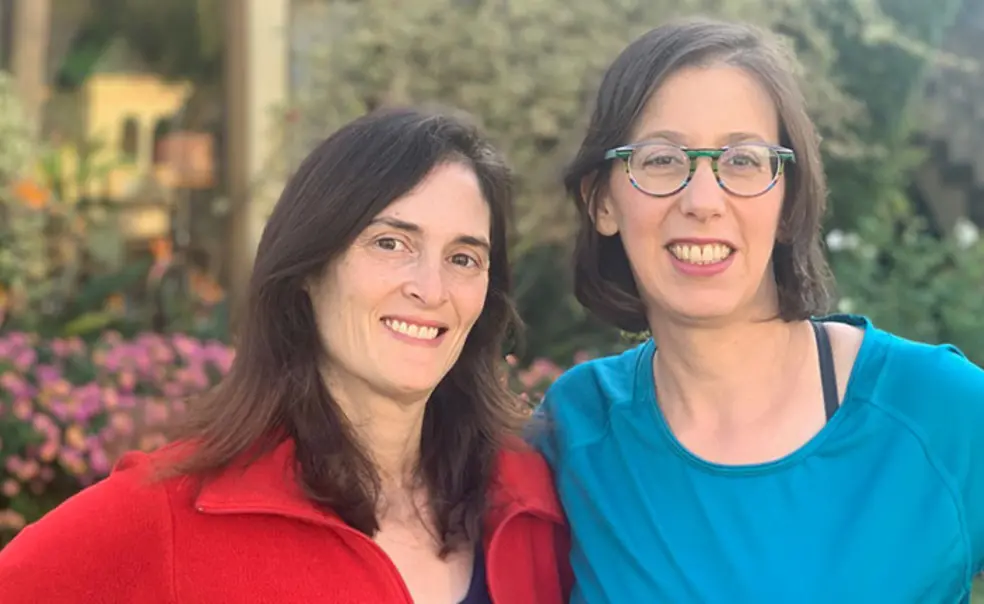Podcast Spotlight: Sheryl Zohn ’95 Goes Hyperlocal on ‘Who’s Next Door’
In the last few months, Sheryl Zohn ’95 has become an investigative reporter of sorts, with an unusual beat: She covers unattended pet waste, unwanted real-estate ads, and undelivered mail.
Zohn and her friend Jesse Lainer-Vos are the co-hosts of Who’s Next Door, a Los Angeles-based podcast series that examines neighborhood complaints posted on local social-media sites. The two neighbors and walking buddies with an abiding interest in Nextdoor and Facebook came up with the idea while talking about the latest happenings in their neighborhood. “We were like, ‘This should be a podcast,’” Zohn says. “So it’s as simple as that.” Well, not quite: The show is more than just riffing on neighborhood drama. It relies on solid reporting and research. A recent episode about mail theft, for example, included an interview with an officer from the U.S. Postal Inspection Service.
Zohn has been a comedy writer for television and print, and the podcast highlights her sense of humor (in one episode, she also calls on her skills as a trumpeter, mostly dormant since her days playing in the Princeton University Band). “This is my first time as ‘talent,’” she jokes. “I’ve never actually been on the air or in front of the camera, so this is kind of a fun project for me.” She spoke with PAW earlier this month.
City living
“We live in a part of Mid-City LA near La Cienega and Olympic, south and east of Beverly Hills. There are a lot of beautiful 1930s homes, a lot of apartment buildings, there’s the Wilshire corridor, which is very business-oriented — there’s a mix; it’s definitely urban living, not at all suburban.
THE PLAYLIST
Three more podcasts to check out this month
1. Princeton computer science professor ED FELTEN works to demystify artificial intelligence in the pilot for AI and U, a new collaboration with WHYY in Philadelphia.
2. Amb. RYAN CROCKER *85 and Anne McElvoy examine what the killing of Qassem Suleimani will mean for the future of U.S.-Iran relations on The Economist Asks.
3. Geneticist ERIC LANDER ’78, president and co-founder of the Broad Institute, discusses the ethics of gene editing with Preet Bharara on Stay Tuned.
“I was a lurker [on neighborhood social media] for a while, and then my car was stolen. I was shocked, and I called the LAPD. They were not shocked. I said, ‘Can you come and take a report? My car is missing!’ And they said um, no, you have to come to us; get a ride. Afterward, I went online and posted it and wow, people were very sympathetic and they asked me questions and told me their cars had been stolen or broken into, which is a very common thing in this part of LA. And I felt a lot of camaraderie with my neighbors, a lot of empathy, and it was kind of nice. So then I started checking in and even went to a neighborhood association meeting to meet some of these people in real life. So having my car stolen got me involved with the neighborhood social media a lot more.”
News you can use
“Sometimes people go a little overboard — and I think Nextdoor in particular is made fun of for that — but their concerns, although maybe not of interest to our big-city politicians or the police, are legitimate concerns and things that affect their daily life. So for instance, we did an episode on real-estate door hangers, which are advertisements, and the person who posted was genuinely upset. He doesn’t want his house broken into [if the ads signaled to burglars which homeowners were out of town]. No one else, except your neighbors, is going to care that much. There’s some community-building involved. We call this hyperlocal news, and I think that’s something that communities are missing now, having that sort of local focus. While we have a little fun and we treat it fairly lightly, we also feel a lot of empathy for the people that we interview.”
Pet peeves
“Things that have opposite sides are obviously more interesting. If there’s a little bit of a debate, that helps — and there’s almost always a debate online. People have a lot of opinions on very small things, so that hasn’t been an issue. We try to reach out to everyone; not everyone has agreed to be interviewed. We go to the ‘scene of the crime,’ or the scene of what everyone is talking about, so we can see first-hand. And one rule of thumb is that we use everyone’s first name only, we’re not using last names. There’s some anonymity. It’s so hyperlocal, we don’t want anyone going up to their doorstep. And while this is a podcast about my neighborhood, I think people in other neighborhoods can relate to it, so by having just first names we make it a little more generic or general for people in other parts of the country who might be interested in hearing these stories. Sure, this is about the dog poop that’s left in my neighborhood, but guess what? There’s a dog-poop perp in their neighborhood as well, and they can relate to the frustration of not having people pick up dog poop.”
Looking beyond LA
“We’ve actually been getting a lot of tips, and in fact if people want to send me more, we’re very open to it. We’ve got a Facebook page and we encourage people to give us tips about their neighborhoods. As we go on, we might expand beyond our neighborhood to have episodes where we discuss issues from other people’s neighborhoods. Everyone has something to say about their neighborhood. That’s one thing I’ve definitely learned.”
Interview conducted and condensed by Brett Tomlinson
Alumni, if you have a podcast that you’d like to share with PAW readers, please email us at paw@princeton.edu.












No responses yet